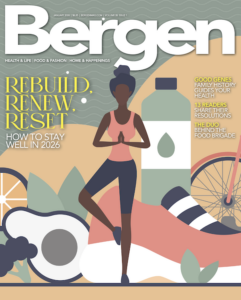Age With Grace (And Vitality!)
Robust, fulfilling senior years are waiting for most of us—if we do our part. A Bergen doctor offers tips on how to get there.

Life is finite—we can’t change that. But there is no reason why the final decades of a life can’t be among the best. Age, after all, brings a wealth of advantages: Experience and the wisdom and confidence that come with time are major assets (and the salt-and-pepper look is always in). Gone are the days when retirement meant taking to the rocking chair and watching the world go by. With life expectancy in the U.S. rising again after taking a dip in 2022, your “golden” years can be fulfilling and fun—if you take proper care of yourself.
Says Despina Psillides, M.D., a geriatrician and primary care physician with Englewood Health who practices in Harrington Park and Northvale: “Aging—and what it means—has shifted significantly in society. People are surprised to learn that at age 65 someone is considered ‘geriatric,’ because people are living more active lives well into their 80s and 90s.”
The keys to achieving that life are “healthy aging” practices. Explains Dr. Psillides: “The goal of healthy aging is not only to live longer, but also to enhance our quality of life as we age.” Though “good sense” practices such as maintaining a healthy, balanced diet, getting regular exercise and keeping up with vaccinations play a large part, it goes beyond that. “We also focus on mental well-being by managing stress, practicing mindfulness and fostering relationships and social connections,” she says.
Ways to age gracefully?
Give yourself a hand
Considering all the ways you use your hands and fingers, it’s logical that keeping them in top condition is a priority. In particular, grip strength can decrease as we get older, which can be a hindrance to independence. A strong grip strength allows you to open jars and prescription bottles, yes, but is also important for catching yourself on something when you fall—and pulling yourself back up to your feet if you do. To maintain your grip strength, Dr. Psillides suggests “squeezing a stress ball while you are watching TV to help maintain strength and flexibility.” In the realm of preventive care, she also suggests using an ergonomic setup if you work at a desk or a computer “to help avoid wrist injuries.” Something as simple as using a wrist rest can significantly lower your risk for carpal tunnel syndrome and other repetitive-strain injuries. The doctor flags “tremors, numbness and tingling” as “concerning” symptoms you should mention to a doctor right away, as they could be signs of a more serious health concern such as Parkinson’s disease.
Hear yourself out
Dr. Psillides calls hearing loss “a significant aspect of aging” and notes that it’s also a risk factor for dementia. “Hearing is a complex process and, when it is impaired, the brain works harder to process and comprehend sounds,” says the geriatrician. “This extra effort can cause strain in other areas of the brain.” Age-related hearing loss, also called presbycusis, is very common—according to Johns Hopkins Medicine, one in three adults between 65 and 74 experiences it. Though there are steps you can take to protect your hearing (reach for ear plugs if your work or play takes you around loud noises and don’t blast music through your earbuds), there’s no surefire way to prevent it. But don’t just accept it. “It is important to get tested for hearing loss early,” says Dr. Psillides. “Even if hearing aids aren’t needed immediately, regular testing allows for comparison over time to track any changes and determine when they might become necessary. Many of the seniors I work with are hesitant to use hearing aids, but I always emphasize the connection between hearing and memory. Plus, modern hearing aids are very different from the older models. Today’s devices include discreet options that are barely noticeable, as well as models that connect directly to Bluetooth for convenience.”
Keep your mind sharp
We all know the benefits of staying physically active (in many respects the phrase “use it or lose it” applies), but keeping mentally active can be just as important. “As a geriatrician, one of my key roles with my patients is discussing memory concerns,” Dr. Psillides says. “Many people underestimate the value of activities that support memory—anything that keeps the mind active, such as puzzles and word games, helps maintain brain health.” Her top tip? “Learning something new is a powerful way to challenge your mind. Whether it’s learning a new song on an instrument or a new card game with friends, this is an easy way to challenge the mind and stimulate cognition.”
Stay connected
“Social connection becomes increasingly important as we age,” says the doctor. “Isolation can be just as much of a health risk as obesity or smoking.” Not only can loneliness contribute to anxiety and depression, it can also speed up cognitive decline and even, according to the National Institute on Aging, put you at a higher risk for high blood pressure and heart disease. “Many communities offer community centers and senior programs that provide classes, lectures and overnight trips to help foster social engagement,” says Dr. Psillides. These programs will also often help you keep up with the active lifestyle and exercise needed to keep your body in good condition.
The doctor stresses communicating with your physician, and considering your health outside of regular doctor’s visits. “We are generally good at managing our physical health through doctors’ appointments and screenings,” she says. “However, we often overlook the importance of caring for our health outside the doctor’s office. Simple practices make a difference.”
Finally, try not to let pride, shyness, fear or a feeling that you ought to be self-sufficient keep you from reaching out for help or advice. “If you feel overwhelmed by the challenges of growing older,” says Dr. Psillides, “your primary care doctor or geriatrician can provide valuable support.”

